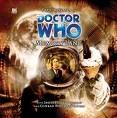 An audio adventure featuring the Eighth Doctor, Charley, and C'rizz
An audio adventure featuring the Eighth Doctor, Charley, and C'rizzWritten by Eddie Robson and directed by Gary Russell
Polarity Rating: 4 out of 5
After listening to my somewhat scathing podcast review of "The Keeper of Traken," a friend suggested that I watch something that was more of a "romp," perhaps something with Daleks. I was inclined to be offended, but then I reviewed my recent writ-up of Infinite Requiem (see below), and now I can't help but think the time is ripe for such a "romp." Memory Lane turned out to be a happy respite.
The Doctor, Charley, and C'rizz (pronounced "care-rizz") dematerialize in a typical English urban neighborhood, but of course everything is not as it seems. Each one of the homes along the seemingly deserted street is occupied by the same elderly woman and her grandson Tom. Why does Tom look much older than he acts? Why does his nan not seem to blink an eye when the TARDIS materializes in her parlor? Why do the same programs play over and over again on the telly? And why does the ice cream man seem so sinister?
By the time the first episode of Memory Lane draws to a conclusion, there's an aftertaste of the confusing M.C. Escher staircases in "Castrovalva," except I'm happy to say that the confusion is eventually explained in this case and in a way that seems quite plausible within the parameters of a science fiction tale. (In case you couldn't tell, I'm not exactly a fan of the "magic" worked into some of the stories during John Nathan-Turner's time on the show.) Of course, this being a Doctor Who story, we know that there have to be sinister minds at work here (more on that later), but the silver lining of this play is the feeling that there's something wrong just beneath the surface, that the seemingly innocuous characters within this universe may not be hiding anything, but perhaps there's a greater force pulling the strings.
If you've read this far and haven't listened to the play, I recommend you stop here, as spoilers abound from here on in. Otherwise (or if you just don't care), please read on. Halfway through the story, we learn that the environment is like a terrarium constructed by alien forces for the purpose of imprisoning Tom, who is not really a six-year-old boy but an astronaut whose vessel crash-landed on the planet decades before. The environment has constructed itself around Tom's memories, using nano-technology to place him in a time and place which he has fond memories of (thus the title Memory Lane). As a result, Tom is inexplicably unaware that he's imprisoned, and has been living out decades playing with Legos in his nan's home.
Once all of this is more or less explained, the environment begins to affect both the Doctor and Charley, with amusing results: Charley believes she's at home with her mother in 1906 (conveniently adorned with 1920's amenities) and at the conclusion of the third episode the Doctor is stuck in a loop in which he believes to have solved the dilemma and explains it all to his companions.
Part of the charm of Memory Lane is that the Doctor and his friends aren't really up against some malevolent force hellbent on conquering the universe or having revenge against the Doctor; this time, it's just a pair of individuals with seemingly innocent intentions, albeit a little misplaced. The "villains" in this case are a pair of bumbling scientists named Argot and Mawvik who are in charge of entertainment on their planet. The problem here is that although their technology is so advanced that it can convince astronaut Tom he's six years old and in his nan's flat, they still have no inkling how to record video images. The Doctor saves the day by introducing them to recording technology, allowing them to record Tom's arrival for prosperity and, as a result, they free him into the Doctor's capable hands.
Eddie Robson is perhaps most popular for his work on Big Finish's Benny Summerfield adventures, although Memory Lane is one of a handful of Doctor Who stories he's written. In his notes on the story, he explains that he enjoys putting his characters in situations where there are odd juxtapositions, such as the phonograph in "The Time Meddler" or the spaceships disguised as Edwardian racing yachts in "Enlightenment." He delivers this eerie juxtaposition in spades with Memory Lane. Going back to my earlier comment about this play being a bit of a "romp" (oh, how I hate using that word in a review!), Robson admits that this is a story without any kind of literary metaphor: it just is what it is!
As with many Big Finish entries, the story seems to prattle on a bit; I found myself looking at my watch through the fourth episode. However, the first two episodes are solid gold, as this is where most of the story's mysterious flavor comes from. The score is also very well done, although I couldn't help but think it sounded almost a little too similar to American Beauty.
It may just be a romp in the form of an audio Rubik's cube, but this romp is just about worth the price of admission.
Fun Facts:
- In Charley's flashback sequence, her mother mentions Edith the kitchen maid. If she sounds familiar, that's because she was the catalyst for all the action in The Chimes of Midnight.

No comments:
Post a Comment